Management Report: International Research Collaboration Challenges
VerifiedAdded on 2022/09/26
|5
|1057
|28
Report
AI Summary
This report examines the challenges of international research collaboration, focusing on the relationship between Cancer Research UK and Cancer Research Institute (CRI). It begins with detailed descriptions of both organizations, including their locations, types, sizes, and primary research areas. The report then delves into specific challenges that arise when collaborating internationally, particularly concerning authorship issues. These challenges include potential disputes over author order and contributions, as well as the submission of research without consent. Additionally, the report explores the difficulties faced by mentors in guiding trainees, such as addressing misconceptions, setting boundaries, allocating time, and providing constructive feedback. The report highlights the complexities of managing these relationships and finding effective solutions for successful international research collaborations.
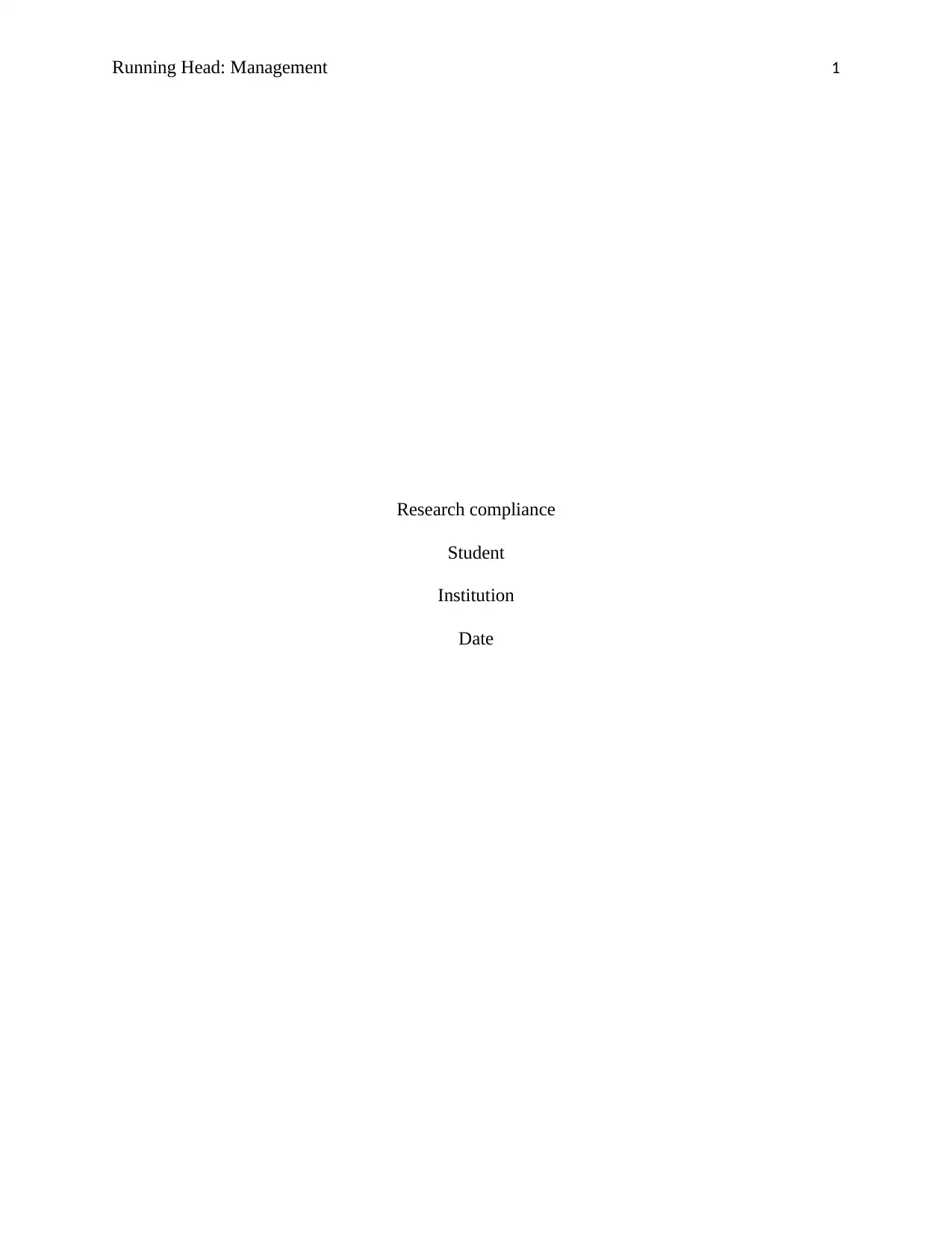
Running Head: Management 1
Research compliance
Student
Institution
Date
Research compliance
Student
Institution
Date
Paraphrase This Document
Need a fresh take? Get an instant paraphrase of this document with our AI Paraphraser
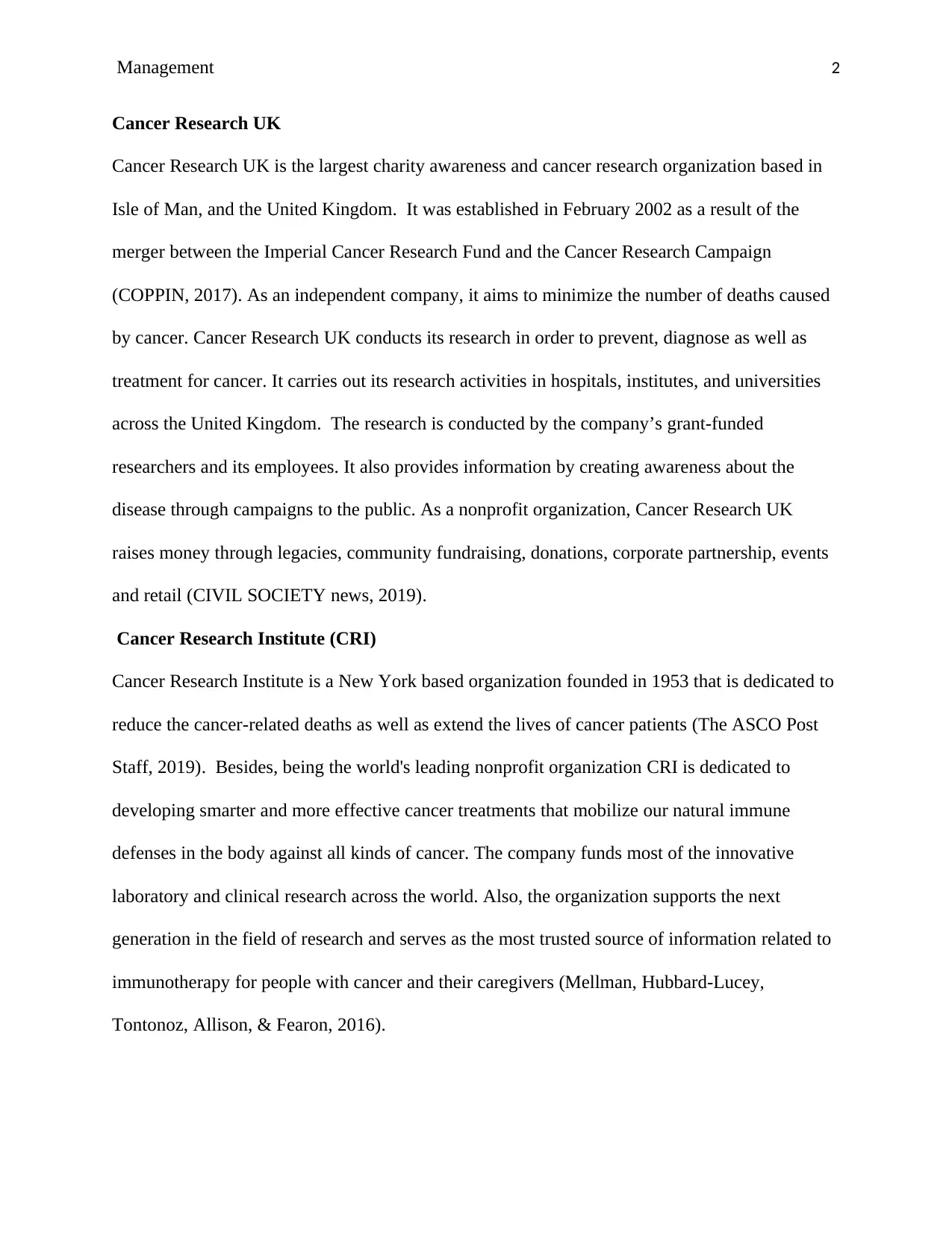
Management 2
Cancer Research UK
Cancer Research UK is the largest charity awareness and cancer research organization based in
Isle of Man, and the United Kingdom. It was established in February 2002 as a result of the
merger between the Imperial Cancer Research Fund and the Cancer Research Campaign
(COPPIN, 2017). As an independent company, it aims to minimize the number of deaths caused
by cancer. Cancer Research UK conducts its research in order to prevent, diagnose as well as
treatment for cancer. It carries out its research activities in hospitals, institutes, and universities
across the United Kingdom. The research is conducted by the company’s grant-funded
researchers and its employees. It also provides information by creating awareness about the
disease through campaigns to the public. As a nonprofit organization, Cancer Research UK
raises money through legacies, community fundraising, donations, corporate partnership, events
and retail (CIVIL SOCIETY news, 2019).
Cancer Research Institute (CRI)
Cancer Research Institute is a New York based organization founded in 1953 that is dedicated to
reduce the cancer-related deaths as well as extend the lives of cancer patients (The ASCO Post
Staff, 2019). Besides, being the world's leading nonprofit organization CRI is dedicated to
developing smarter and more effective cancer treatments that mobilize our natural immune
defenses in the body against all kinds of cancer. The company funds most of the innovative
laboratory and clinical research across the world. Also, the organization supports the next
generation in the field of research and serves as the most trusted source of information related to
immunotherapy for people with cancer and their caregivers (Mellman, Hubbard-Lucey,
Tontonoz, Allison, & Fearon, 2016).
Cancer Research UK
Cancer Research UK is the largest charity awareness and cancer research organization based in
Isle of Man, and the United Kingdom. It was established in February 2002 as a result of the
merger between the Imperial Cancer Research Fund and the Cancer Research Campaign
(COPPIN, 2017). As an independent company, it aims to minimize the number of deaths caused
by cancer. Cancer Research UK conducts its research in order to prevent, diagnose as well as
treatment for cancer. It carries out its research activities in hospitals, institutes, and universities
across the United Kingdom. The research is conducted by the company’s grant-funded
researchers and its employees. It also provides information by creating awareness about the
disease through campaigns to the public. As a nonprofit organization, Cancer Research UK
raises money through legacies, community fundraising, donations, corporate partnership, events
and retail (CIVIL SOCIETY news, 2019).
Cancer Research Institute (CRI)
Cancer Research Institute is a New York based organization founded in 1953 that is dedicated to
reduce the cancer-related deaths as well as extend the lives of cancer patients (The ASCO Post
Staff, 2019). Besides, being the world's leading nonprofit organization CRI is dedicated to
developing smarter and more effective cancer treatments that mobilize our natural immune
defenses in the body against all kinds of cancer. The company funds most of the innovative
laboratory and clinical research across the world. Also, the organization supports the next
generation in the field of research and serves as the most trusted source of information related to
immunotherapy for people with cancer and their caregivers (Mellman, Hubbard-Lucey,
Tontonoz, Allison, & Fearon, 2016).
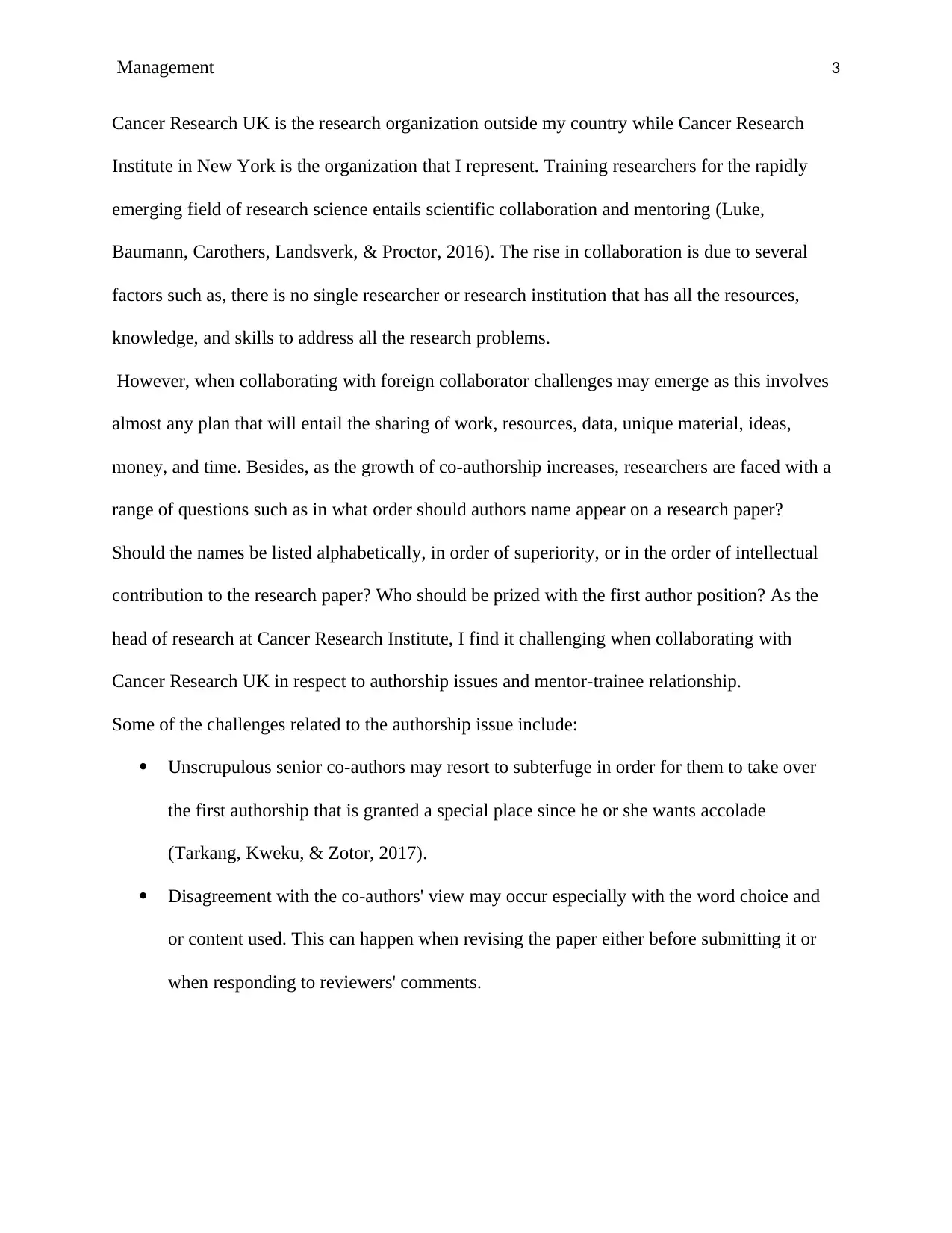
Management 3
Cancer Research UK is the research organization outside my country while Cancer Research
Institute in New York is the organization that I represent. Training researchers for the rapidly
emerging field of research science entails scientific collaboration and mentoring (Luke,
Baumann, Carothers, Landsverk, & Proctor, 2016). The rise in collaboration is due to several
factors such as, there is no single researcher or research institution that has all the resources,
knowledge, and skills to address all the research problems.
However, when collaborating with foreign collaborator challenges may emerge as this involves
almost any plan that will entail the sharing of work, resources, data, unique material, ideas,
money, and time. Besides, as the growth of co-authorship increases, researchers are faced with a
range of questions such as in what order should authors name appear on a research paper?
Should the names be listed alphabetically, in order of superiority, or in the order of intellectual
contribution to the research paper? Who should be prized with the first author position? As the
head of research at Cancer Research Institute, I find it challenging when collaborating with
Cancer Research UK in respect to authorship issues and mentor-trainee relationship.
Some of the challenges related to the authorship issue include:
Unscrupulous senior co-authors may resort to subterfuge in order for them to take over
the first authorship that is granted a special place since he or she wants accolade
(Tarkang, Kweku, & Zotor, 2017).
Disagreement with the co-authors' view may occur especially with the word choice and
or content used. This can happen when revising the paper either before submitting it or
when responding to reviewers' comments.
Cancer Research UK is the research organization outside my country while Cancer Research
Institute in New York is the organization that I represent. Training researchers for the rapidly
emerging field of research science entails scientific collaboration and mentoring (Luke,
Baumann, Carothers, Landsverk, & Proctor, 2016). The rise in collaboration is due to several
factors such as, there is no single researcher or research institution that has all the resources,
knowledge, and skills to address all the research problems.
However, when collaborating with foreign collaborator challenges may emerge as this involves
almost any plan that will entail the sharing of work, resources, data, unique material, ideas,
money, and time. Besides, as the growth of co-authorship increases, researchers are faced with a
range of questions such as in what order should authors name appear on a research paper?
Should the names be listed alphabetically, in order of superiority, or in the order of intellectual
contribution to the research paper? Who should be prized with the first author position? As the
head of research at Cancer Research Institute, I find it challenging when collaborating with
Cancer Research UK in respect to authorship issues and mentor-trainee relationship.
Some of the challenges related to the authorship issue include:
Unscrupulous senior co-authors may resort to subterfuge in order for them to take over
the first authorship that is granted a special place since he or she wants accolade
(Tarkang, Kweku, & Zotor, 2017).
Disagreement with the co-authors' view may occur especially with the word choice and
or content used. This can happen when revising the paper either before submitting it or
when responding to reviewers' comments.
⊘ This is a preview!⊘
Do you want full access?
Subscribe today to unlock all pages.

Trusted by 1+ million students worldwide
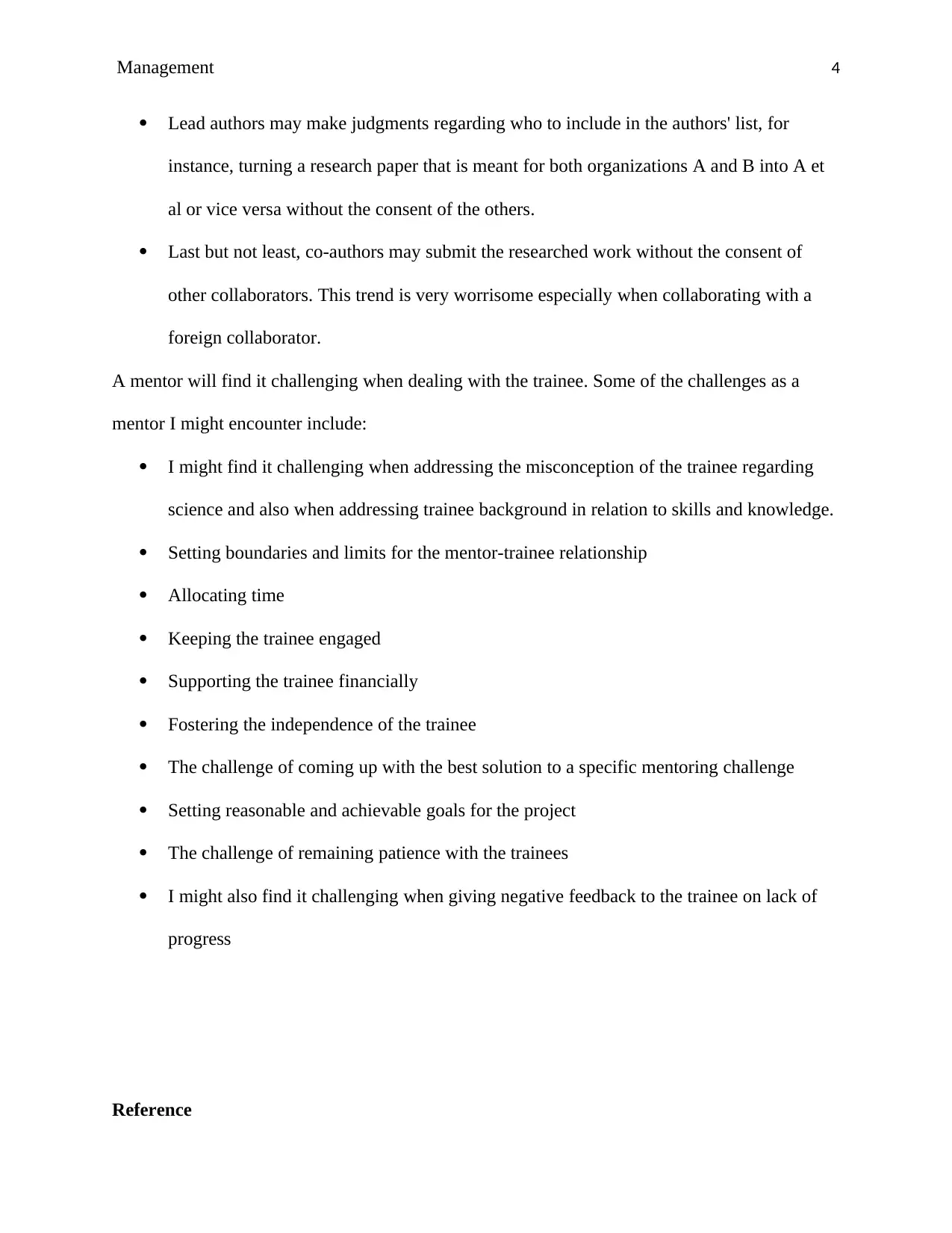
Management 4
Lead authors may make judgments regarding who to include in the authors' list, for
instance, turning a research paper that is meant for both organizations A and B into A et
al or vice versa without the consent of the others.
Last but not least, co-authors may submit the researched work without the consent of
other collaborators. This trend is very worrisome especially when collaborating with a
foreign collaborator.
A mentor will find it challenging when dealing with the trainee. Some of the challenges as a
mentor I might encounter include:
I might find it challenging when addressing the misconception of the trainee regarding
science and also when addressing trainee background in relation to skills and knowledge.
Setting boundaries and limits for the mentor-trainee relationship
Allocating time
Keeping the trainee engaged
Supporting the trainee financially
Fostering the independence of the trainee
The challenge of coming up with the best solution to a specific mentoring challenge
Setting reasonable and achievable goals for the project
The challenge of remaining patience with the trainees
I might also find it challenging when giving negative feedback to the trainee on lack of
progress
Reference
Lead authors may make judgments regarding who to include in the authors' list, for
instance, turning a research paper that is meant for both organizations A and B into A et
al or vice versa without the consent of the others.
Last but not least, co-authors may submit the researched work without the consent of
other collaborators. This trend is very worrisome especially when collaborating with a
foreign collaborator.
A mentor will find it challenging when dealing with the trainee. Some of the challenges as a
mentor I might encounter include:
I might find it challenging when addressing the misconception of the trainee regarding
science and also when addressing trainee background in relation to skills and knowledge.
Setting boundaries and limits for the mentor-trainee relationship
Allocating time
Keeping the trainee engaged
Supporting the trainee financially
Fostering the independence of the trainee
The challenge of coming up with the best solution to a specific mentoring challenge
Setting reasonable and achievable goals for the project
The challenge of remaining patience with the trainees
I might also find it challenging when giving negative feedback to the trainee on lack of
progress
Reference
Paraphrase This Document
Need a fresh take? Get an instant paraphrase of this document with our AI Paraphraser
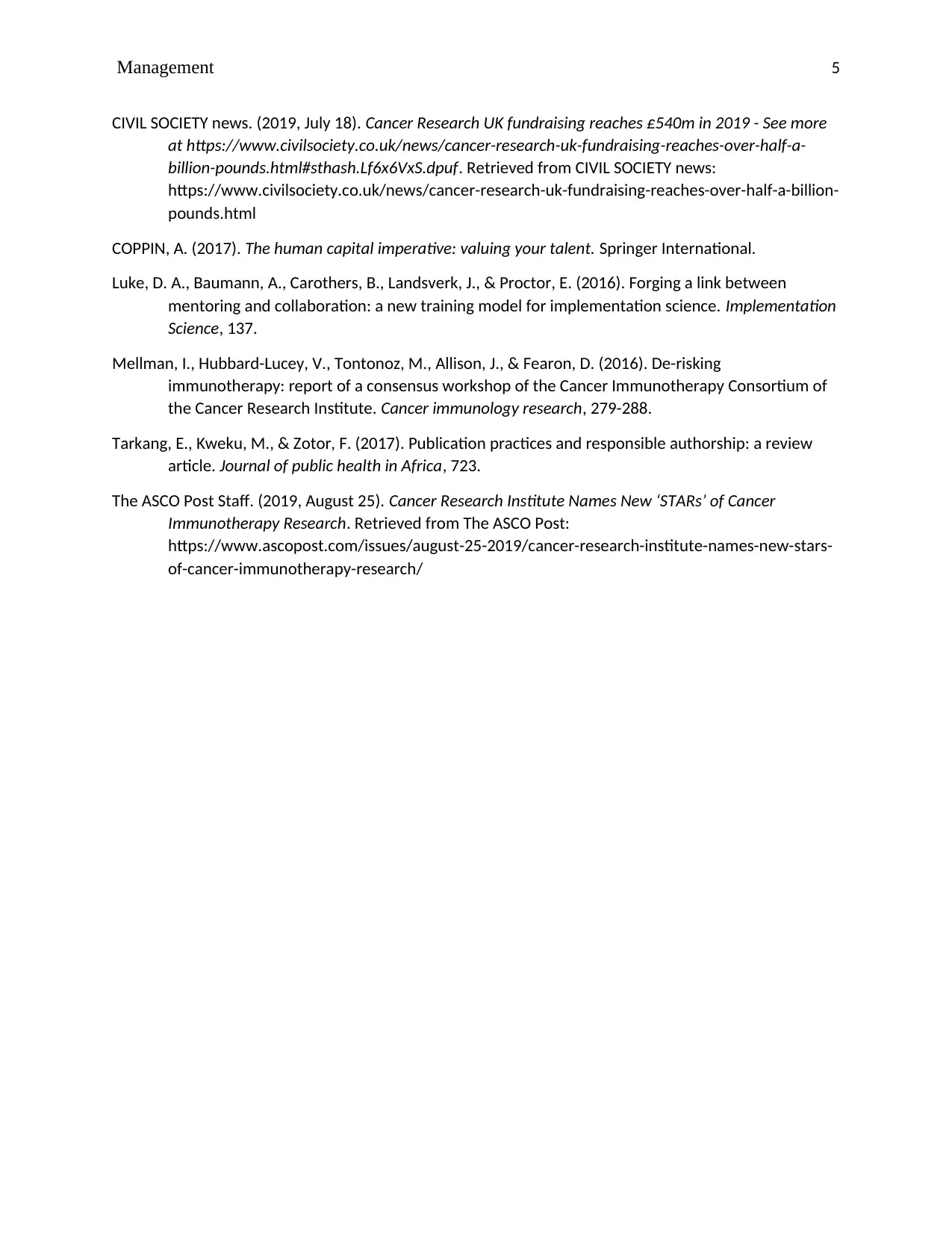
Management 5
CIVIL SOCIETY news. (2019, July 18). Cancer Research UK fundraising reaches £540m in 2019 - See more
at https://www.civilsociety.co.uk/news/cancer-research-uk-fundraising-reaches-over-half-a-
billion-pounds.html#sthash.Lf6x6VxS.dpuf. Retrieved from CIVIL SOCIETY news:
https://www.civilsociety.co.uk/news/cancer-research-uk-fundraising-reaches-over-half-a-billion-
pounds.html
COPPIN, A. (2017). The human capital imperative: valuing your talent. Springer International.
Luke, D. A., Baumann, A., Carothers, B., Landsverk, J., & Proctor, E. (2016). Forging a link between
mentoring and collaboration: a new training model for implementation science. Implementation
Science, 137.
Mellman, I., Hubbard-Lucey, V., Tontonoz, M., Allison, J., & Fearon, D. (2016). De-risking
immunotherapy: report of a consensus workshop of the Cancer Immunotherapy Consortium of
the Cancer Research Institute. Cancer immunology research, 279-288.
Tarkang, E., Kweku, M., & Zotor, F. (2017). Publication practices and responsible authorship: a review
article. Journal of public health in Africa, 723.
The ASCO Post Staff. (2019, August 25). Cancer Research Institute Names New ‘STARs’ of Cancer
Immunotherapy Research. Retrieved from The ASCO Post:
https://www.ascopost.com/issues/august-25-2019/cancer-research-institute-names-new-stars-
of-cancer-immunotherapy-research/
CIVIL SOCIETY news. (2019, July 18). Cancer Research UK fundraising reaches £540m in 2019 - See more
at https://www.civilsociety.co.uk/news/cancer-research-uk-fundraising-reaches-over-half-a-
billion-pounds.html#sthash.Lf6x6VxS.dpuf. Retrieved from CIVIL SOCIETY news:
https://www.civilsociety.co.uk/news/cancer-research-uk-fundraising-reaches-over-half-a-billion-
pounds.html
COPPIN, A. (2017). The human capital imperative: valuing your talent. Springer International.
Luke, D. A., Baumann, A., Carothers, B., Landsverk, J., & Proctor, E. (2016). Forging a link between
mentoring and collaboration: a new training model for implementation science. Implementation
Science, 137.
Mellman, I., Hubbard-Lucey, V., Tontonoz, M., Allison, J., & Fearon, D. (2016). De-risking
immunotherapy: report of a consensus workshop of the Cancer Immunotherapy Consortium of
the Cancer Research Institute. Cancer immunology research, 279-288.
Tarkang, E., Kweku, M., & Zotor, F. (2017). Publication practices and responsible authorship: a review
article. Journal of public health in Africa, 723.
The ASCO Post Staff. (2019, August 25). Cancer Research Institute Names New ‘STARs’ of Cancer
Immunotherapy Research. Retrieved from The ASCO Post:
https://www.ascopost.com/issues/august-25-2019/cancer-research-institute-names-new-stars-
of-cancer-immunotherapy-research/
1 out of 5
Your All-in-One AI-Powered Toolkit for Academic Success.
+13062052269
info@desklib.com
Available 24*7 on WhatsApp / Email
![[object Object]](/_next/static/media/star-bottom.7253800d.svg)
Unlock your academic potential
Copyright © 2020–2025 A2Z Services. All Rights Reserved. Developed and managed by ZUCOL.